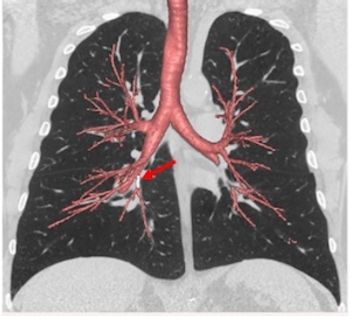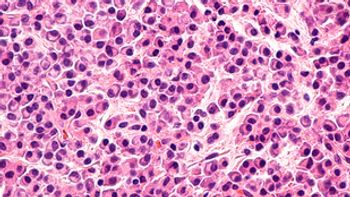
Earlier this month, the FDA approved the first ever migraine drug, galcanezumab-gnlm (Emgality, Lilly) indicated to treat cluster headaches.

Earlier this month, the FDA approved the first ever migraine drug, galcanezumab-gnlm (Emgality, Lilly) indicated to treat cluster headaches.

According to a recent study, data collected through a wearable device called the Personal Kinetigraph (PKG) can assist clinicians in recognizing patients with Parkinson disease who may benefit from deep-brain stimulation or other device-assisted therapies.

Today marks the second annual International NASH Day created to raise awareness about nonalcoholic steatohepatitis (NASH) and fatty liver disease.

According to new research, recent advances in acoustic engineering and artificial intelligence have “shown promise” in the identification of respiratory conditions based on sound analysis, which may thus reduce dependence on support services and clinical expertise.

The American Society of Clinical Oncology recently held its annual meeting in Chicago, Illinois. The meeting brought together oncologists, payers, and other stakeholders to discuss the latest updates and therapeutic advances in cancer care. Here are 5 of the biggest takeaways from the meeting.

Though chimeric antigen receptor (CAR) T-cell therapy has been largely touted as one of the most important advances in cancer care in recent years, the therapy comes with the risk of severe toxicities as well as increased financial burden due to the high cost of the drugs.

A number of abstracts at the 2019 American Society of Clinical Oncology Annual Meeting, held May 31 to June 4, 2019, in Chicago, Illinois, featured studies that focused on using real-world data to advance research and cancer care in non–small cell lung cancer (NSCLC).

During the American Society of Clinical Oncology’s Annual Meeting which took place May 31-June 4, 2019 in Chicago, Illinois, oncologists and representatives from UnitedHealthcare and the Center for Medicare and Medicaid Innovation (CMMI) took the stage to discuss oncology reimbursement reform and whether there are changes on the horizon for the promotion of higher value care.

Parth Shah, PharmD, PhD, of the Fred Hutchinson Cancer Research Center, led a discussion on the uptake challenges of the human papilloma virus (HPV) vaccine at the American Society of Clinical Oncology’s Annual Meeting by first explaining the known percentages of attributable cancers to the virus in the United States: cervical cancer 91%, vagina cancer 75%, and vulva cancer 69%, among others. Although multiple cancers are attributable to the virus, explained Shah, of the population ages 13-17 in the United States that should be vaccinated, both boys and girls, only 49% actually receive the vaccine.

Oncologists, patient advocates, patients, and other stakeholders from around the world gathered to hear different perspectives regarding the use of cannabis in symptom management for patients with cancer. Panelist after panelist went up to present available data, and each reiterated the same point: We need more research.

Drug pricing seemed like an appropriate topic for ASCO's town hall as the Trump administration has made lowering the cost of medications a major objective. By doing so, the administration has put out a series of proposals looking to address the cost of drugs, such as the International Pricing Index (IPI), and the recently finalized rule around direct-to-consumer advertising for pharmaceutical companies.

According to a recent study, people with bipolar disorder were more likely to later develop Parkinson disease (PD) compared with patients who do not have the disorder.

“How do you currently collaborate with your primary care colleagues in caring for patients with cancer?” This was how Larissa Nekhlyudov, MD, MPH, opened a session titled “Bringing the Primary Care Physician Back Into Cancer Care,” during the American Society of Clinical Oncology’s Annual Meeting, held in Chicago, Illinois from May 31-June 4, 2019.

According to results from a recent retrospective study, patients previously diagnosed with a hematologic malignancy were found to be at a higher risk of developing head and neck cancers compared with patients without a prior hematologic malignancy.

FDA approved alpelisib (Piqray), an oral drug to be used in combination with endocrine therapy fulvestrant for the treatment of men and postmenopausal women with hormone receptor (HR-positive), human epidermal growth factor receptor 2 (HER2)-negative, PIK3CA-mutated, advanced or metastatic breast cancer following disease progression on or after an endocrine-based regimen.

As a precursor to myeloma, smoldering multiple myeloma (MM) currently has no treatment. In fact, the standard of care is observation until the patient starts to present with symptoms. However, according to new research that will be presented at the American Society of Clinical Oncology’s annual meeting in Chicago, Illinois, held May 31 to June 4, early treatment of smoldering MM may delay progression to full-blown disease.

Researchers recently conducted a study in which they trained an artificial intelligence (AI) deep learning tool to detect lung cancer tumors in computed tomography scans. The algorithm's evaluation was then compared with that of 6 radiologists, and the results showed that the AI was more accurate when prior CT imaging was not available.

In a recent study, researchers looked to determine the effect of erenumab (Aimovig) on health-related quality of life (HRQOL), headache impact, and disability in patients with chronic migraine.

In a study to be presented at the American Thoracic Society (ATS) Annual Meeting, held in Dallas, Texas on May 17-22, 2019, researchers investigated visit-to-visit variability in the forced vital capacity (FVC) of patients with idiopathic pulmonary fibrosis (IPF).

According to new research published in PNAS, researchers have determined that a molecule that helps blood clot may also play a role in multiple sclerosis (MS) relapses, in addition to discovering a new way of studying the disease in mice that more closely resembles the human form.

A recent study employed the use of a high-throughput ultrasonication-induced amyloid fibrillation assay to amplify and detect α-synuclein aggregates from cerebrospinal fluid (CSF), and investigated the association between seeding activity and clinical indicators. The assay, created by the study investigators and dubbed the HANdai Amyloid Burst Inducer (HANABI), dramatically reduces the time to perform the assay from the estimated 10 days for the shaking-based assays to only several hours.

The Leapfrog Group, a national nonprofit organization, this week released the latest hospital safety grades for Spring 2019 in addition to a report compiled in conjunction with the Johns Hopkins Armstrong Institute for Patient Safety and Quality that assessed the number of deaths due to errors, accidents, injuries and infections at all rated hospitals.

During an oral presentation of abstracts at the American Academy of Neurology’s 2019 Annual Meeting in Philadelphia, Pennsylvania, held May 4-10, researchers presented findings that suggest that while pregnant women with multiple sclerosis (MS) are often viewed as high-risk by their physician, pregnancy did not seem to increase the risk of adverse obstetrical outcomes for patients nor their babies.

During the American Thoracic Society’s Annual Meeting in Dallas, Texas, taking place May 17-22, 2019, researchers will present findings from a study investigating pirfenidone (Esbriet) in the treatment of idiopathic pulmonary fibrosis (IPF) in a real-world setting.

According to a recent study, hypoxia associated with episodes of upper airway obstruction in patients with obstructive sleep apnea syndrome may increase the levels of α‐synuclein in the blood and thus may contribute to the development of Parkinson disease.

Rates of low birth weight and premature birth are higher in the United States than most other developed nations, and these factors are believed to contribute to nearly 36% of infant mortality. A recent study sought to evaluate whether Medicaid expansion was associated with changes in rates of low birth weight and preterm outcomes, both overall and by race/ethnicity.

According to a recent study, patients with common lung diseases such as asthma, chronic obstructive pulmonary disease, and lung fibrosis are significantly more likely to develop cardiovascular disease.

A recent study found that younger patients with migraine had greater cerebrovascular reactivity impairment in the posterior cerebral artery, which could lead to an increased risk of stroke.

Parkinson disease (PD) is the second most common neurodegenerative disorder found in the elderly, currently affecting an estimated 2% of individuals 60 years or older. PD is a multifactorial disease in which both environmental and genetic factors are significantly associated with disease onset. Although symptoms of the disease may present with a tremor or perhaps a speech problem, by the time the symptoms are evident, it is often too late to stop the progression of the disease.

In a study to be presented at the American Academy of Neurology’s annual meeting next week, May 4-10, 2019, in Philadelphia, Pennsylvania, researchers found that the out-of-pocket costs for neurologic medications have increased significantly over the past 12 years, particularly for those enrolled in high-deductible health plans.

259 Prospect Plains Rd, Bldg H
Cranbury, NJ 08512
© 2025 MJH Life Sciences®
All rights reserved.
